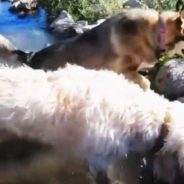Can dogs have panic attacks?
You know your dog can get stressed, but just how stressed can they get? Are panic attacks possible? Unfortunately, yes they are. It’s not uncommon for dog owners to wonder if their furry friend can experience the same range of emotions that humans do. After all, dogs are known to feel stress and anxiety in certain situations. But, can dogs have panic attacks? The short answer is yes – dogs can definitely have panic attacks. In this article, we’ll take a look at what these episodes might look like, what causes them, and how...
Be Careful when You Take Your Dog to a Freshwater Stream where It Can Die from Salmon Poisoning
“While all fish caught or originating from streams in northern California could potentially be infected, the California Department of Fish and Wildlife (CDFW) cautions that trout stocked in some waters in CDFW’s North Central Region are more likely to be infected with the flukes that cause Salmon Poisoning Disease.” You should not cast away your caution just because you and your dog do not live in northern California. Salmon poisoning also happens in Washington, Oregon, and as far as the Southern Vancouver Island in Canada....
How Do Sounds Affect Your Dog Or Cat?
Your dog or cat’s sense of hearing is far more sensitive than yours, so he can be stressed by sounds you may not even be aware of. Find out how to create a more soothing soundscape for him in your home. It’s New Year’s Eve and the fireworks are starting. Your dog or cat trembles, lowers his tail, and runs off to a safe place such as his crate or under the bed. Loud noises like fireworks and thunder are scary for a lot of animals, and even to some people, especially children. But what about the sounds we humans don’t...
Dog was Tied to a Fire Hydrant before Being Abandoned Forever
What should you do if you could no longer take care of your dog? Tying it to a fire hydrant is certainly not the answer. And yet, this was exactly what six-year-old Baby Girl went through when her owners decided to give her up. The dog was tied to a fire hydrant with her things inside a BIG bag which included toys, treats, and dog food. Although her owners might have intended for Baby Girl to survive with a chance to go on enjoying her beloved stuff, Kylie Engelhardt, who found the dog, still thought it was an irresponsible way to dispose of...
Moving house? 5 steps to make it easier on your dog or cat
Submission Guidelines Thank you for your interest in writing for Animal Wellness. As the #1 natural health magazine for pets in North America, we take pride in providing our readers with the information they need to make wise health care choices for their animal companions. Our publication embraces the entire holistic spectrum, from physical health issues to the emotional and spiritual well being of our animals. We welcome unsolicited articles and story outlines as long as they focus on holistic healing, whether physical, emotional or...
April Showers Bring (Dog-Friendly) May Flowers!
We’re well into the spring season which means one thing – it’s time to get planting! If you plan on doing some gardening this season, why not fill your garden with dog-friendly plants? We’ve put together a list of some of our favorite pet-safe plants, including a few that stand up well to even the most rambunctious pup. Camellia This beautiful flowering shrub originates in eastern and southern Asia but has become popular worldwide with gardeners looking for an easy to care for evergreen. Their vibrant flowers bloom in...
Rescue Dog Watches over Toddler Even at Night to Keep Him Safe
How much loyal love a dog has for his owners is just amazing! Emily did not expect that their rescue dog Kendall would become the number 1 protector of their son. Kendall was short of a few hours to being euthanized when Emily and Davy agreed to adopt her. Emily saw her picture and felt that she was the right companion for their dog Tiger. Photo: YouTube/The Dodo Yes, the two dogs became close friends. But in the early months of her adoption, Kendall was such a destructive dog. Emily and Davy were almost tempted to regret their decision, but...
Retired Firefighter Received Best News during Interview about His Stolen Pit Bulls
Kevin Johnson is a retired firefighter from Calavera County, California. He is the owner of two pit bulls named Hay Hay, ten months old, and Nina, six years old. Photo: YouTube/CBS Sacramento He loves them as if they were his children. He was also looking forward to one of them becoming a certified emotional support dog to help him recover from the trauma of his more than 30 years in the service of firefighting and rescue. But his experience did not prepare him for what was going to happen to his two pit bulls in the quiet neighborhood where...
Diet and supplements help dog’s joint issues
Submission Guidelines Thank you for your interest in writing for Animal Wellness. As the #1 natural health magazine for pets in North America, we take pride in providing our readers with the information they need to make wise health care choices for their animal companions. Our publication embraces the entire holistic spectrum, from physical health issues to the emotional and spiritual well being of our animals. We welcome unsolicited articles and story outlines as long as they focus on holistic healing, whether physical, emotional or...
Smoothies you can share with your dog
Smoothies are a delicious and refreshing way to boost nutritional intake. And with a few ingredient tweaks, you can also share them your dog! Smoothies have become a nutritional mainstay for many people. Just toss some fresh fruits, veggies, nut milk, yogurt, or other ingredients into a blender, food processer or Magic Bullet, and voila – you have a flavorful drink that’s packed full of health-boosting vitamins and minerals. But here’s what makes smoothies even better – you can share them with your dog! Each of the...

























